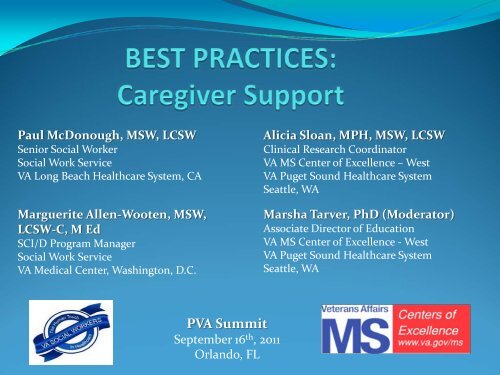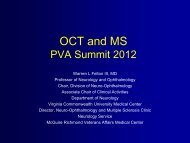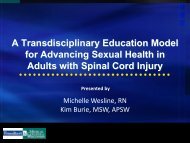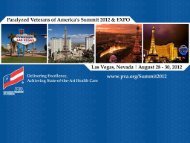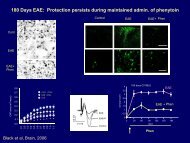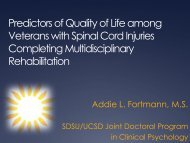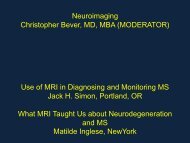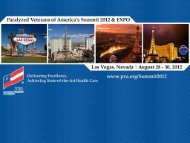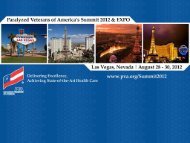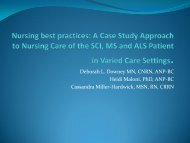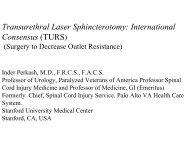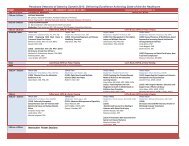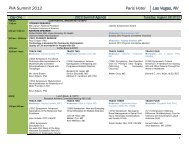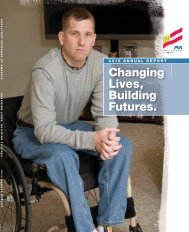Alicia Sloan, MPH, MSW, LICSW - Paralyzed Veterans of America
Alicia Sloan, MPH, MSW, LICSW - Paralyzed Veterans of America
Alicia Sloan, MPH, MSW, LICSW - Paralyzed Veterans of America
Create successful ePaper yourself
Turn your PDF publications into a flip-book with our unique Google optimized e-Paper software.
Paul McDonough, <strong>MSW</strong>, LCSW<br />
Senior Social Worker<br />
Social Work Service<br />
VA Long Beach Healthcare System, CA<br />
Marguerite Allen‐Wooten, <strong>MSW</strong>,<br />
LCSW‐C, M Ed<br />
SCI/D Program Manager<br />
Social Work Service<br />
VA Medical Center, Washington, D.C.<br />
<strong>Alicia</strong> <strong>Sloan</strong>, <strong>MPH</strong>, <strong>MSW</strong>, LCSW<br />
Clinical Research Coordinator<br />
VA MS Center <strong>of</strong> Excellence –West<br />
VA Puget Sound Healthcare System<br />
Seattle, WA<br />
Marsha Tarver, PhD (Moderator)<br />
Associate Director <strong>of</strong> Education<br />
VA MS Center <strong>of</strong> Excellence ‐ West<br />
VA Puget Sound Healthcare System<br />
Seattle, WA<br />
PVA Summit<br />
September 16 th , 2011<br />
Orlando, FL
Learning Objectives<br />
At the conclusion <strong>of</strong> this activity, the participant will be<br />
able to:<br />
1. Define “caregiver” & provide a clear picture <strong>of</strong> the<br />
challenges & needs <strong>of</strong> caregivers <strong>of</strong> our <strong>Veterans</strong>.<br />
2. Discuss current caregiver support “best practices” &<br />
policies.<br />
3. Review current VA practices & research that address<br />
caregiver support for our <strong>Veterans</strong> with SCI & MS.<br />
2
Disclosures<br />
All speakers have no financial interest or<br />
relationships to disclose.<br />
CME Staff Disclosures: Pr<strong>of</strong>essional Education<br />
Services Group staff have no financial interest or<br />
relationships to disclose.<br />
3
Disclosures Continued<br />
This continuing education activity is managed and accredited by<br />
Pr<strong>of</strong>essional Education Services Group and is supported through an<br />
independent educational grant from <strong>Paralyzed</strong> <strong>Veterans</strong> <strong>of</strong> <strong>America</strong>.
Paul McDonough, <strong>MSW</strong>, LCSW<br />
Senior Social Worker<br />
Social Work Service<br />
VA Long Beach Healthcare System, CA<br />
September 16 th , 2011
Different <strong>Veterans</strong> / Different Needs<br />
• WWII<br />
• Korea<br />
• Vietnam<br />
• Gulf War “1”<br />
• OEF/OIF/OND<br />
McDonough, 8/16/11<br />
6
Caregiver Demographics<br />
Veteran vs. National Statistics<br />
Caregivers <strong>of</strong> <strong>Veterans</strong><br />
(n = 462)<br />
Caregivers <strong>of</strong> Adults<br />
Nationally (n = 1,307)<br />
Female caregiver 96% 65%<br />
Spousal caregiver 70% 6%<br />
Caregiver lives with care<br />
recipient 80% 23%<br />
Primary caregiver 82% 53%<br />
Caregiving for 10 years or<br />
more 30% 15%<br />
Source: Caregivers <strong>of</strong> <strong>Veterans</strong> – Serving the Homefront study, www.caregiving.org, 2010.<br />
McDonough, 8/16/11<br />
7
Caregiver Demographics<br />
Veteran vs. National Statistics<br />
Caregivers <strong>of</strong> <strong>Veterans</strong><br />
(n = 462)<br />
Caregivers <strong>of</strong> Adults<br />
Nationally (n = 1,307)<br />
High Emotional Stress<br />
(4+ on 5‐point scale) 68% 31%<br />
High Physical Strain<br />
(4+ on 5‐point scale) 40% 14%<br />
Stopped working or took<br />
early retirement<br />
(among those who<br />
worked while caregiving)<br />
47% 9%<br />
High Financial Hardship<br />
(4+ on 5‐point scale) 50% 13%<br />
Source: Caregivers <strong>of</strong> <strong>Veterans</strong> – Serving the Homefront study, www.caregiving.org, 2010.<br />
McDonough, 8/16/11<br />
8
Caregiving Strengths<br />
• Improved relationship with care recipient & family.<br />
• Improved sense <strong>of</strong> self‐worth.<br />
• Note: It is essential for person providing care to label<br />
themselves as a “caregiver” to receive proper support.<br />
McDonough, 8/16/11<br />
9
Caregiving Challenges<br />
• Increased stress / anxiety<br />
• Sleep deprivation<br />
• Decreased self‐care behaviors<br />
Healthy eating<br />
Exercise<br />
Routine health & dental/vision care<br />
• Financial difficulties<br />
Loss / decreased abilities<br />
Loss / decreased time to work<br />
• Poor health<br />
• Death<br />
• Note: Isolation & lack <strong>of</strong> support are primary factors in<br />
exacerbating these challenges.<br />
McDonough, 8/16/11<br />
10
National VA Programs<br />
• Fee‐Basis/Contract /In‐Home Programs:<br />
‣ Adult Day Healthcare<br />
‣ Home Based Primary Care<br />
‣ Skilled Home Care (Visiting Nurse)<br />
‣ Homemaker/Home Health Aid<br />
‣ Home Telehealth<br />
‣ Respite Care<br />
‣ Home Hospice Care<br />
• Caregiver support line: (855) 260‐3274<br />
• Caregiver support website: www.caregiver.va.gov<br />
• Caregiver support coordinators<br />
McDonough, 8/16/11<br />
11
National Program Specific to SCI/D<br />
• Annual Psychosocial Assessment<br />
• Fee‐Basis: Bowel and Bladder<br />
• 30 days! Respite Care<br />
• SCI/D Home Care<br />
‣ Home Based Primary Care utilizing SCI Staff<br />
• Policy<br />
‣ VHA SCI/D Handbook 1176<br />
www.va.gov/vhapublications/ViewPublication.asp?pub_ID=2365<br />
‣ New! VHA Multiple Sclerosis SOC Handbook 1011.06<br />
www.va.gov/ms/documents/MSHandbook09.pdf<br />
McDonough, 8/16/11<br />
16
Homework<br />
• Visit! www.caregiver.va.gov<br />
• Identify! Name and contact information <strong>of</strong> your<br />
Caregiver Support Coordinator.<br />
‣ Call and ask about local programs and referrals.<br />
• Develop! 1‐page resource list for the caregivers <strong>of</strong> your<br />
specific <strong>Veterans</strong>.<br />
‣ Make it easily available.<br />
McDonough, 8/16/11<br />
17
<strong>Alicia</strong> <strong>Sloan</strong>, <strong>MPH</strong>, <strong>MSW</strong>, LCSW<br />
Clinical Research Coordinator<br />
VA MS Center <strong>of</strong> Excellence –West<br />
VA Puget Sound Healthcare System<br />
Seattle, Washington
MS/SCI Caregiver Studies<br />
• The Hidden Patient: “The n <strong>of</strong> 2!”<br />
• Caregivers Accepting Help<br />
• Caregivers Seeking Help<br />
• Caregiver Burden/Stress<br />
• Caregiver Quality <strong>of</strong> Life<br />
• MSCoE Specific Studies<br />
• SCI Specific Studies<br />
<strong>Sloan</strong>, 8/16/11<br />
20
Literature Search Results<br />
PubMed Key Words:<br />
• caregiver, spinal cord, veterans = 9<br />
• caregiver, multiple sclerosis, veterans = 2<br />
Both publications from VA Puget Sound/MSCOE<br />
• caregiver, veterans = 426<br />
<strong>Sloan</strong>, 8/16/11 21
Caregivers ‐ “The Hidden Patient”<br />
Informal Caregivers:<br />
Unique Challenges<br />
‣ MS Caregiver burden research only 20 years old.<br />
‣ 2011 Lit Review (Dunn, 2011): MS mobility impairment & CG burden.<br />
‣ Aronson (1997) first CG quality <strong>of</strong> life study.<br />
• 697 Respondents with MS, 345 Caregivers.<br />
‣ Caregiving reduces need for paid healthcare services outside home.<br />
‣ Loss <strong>of</strong> mobility , greater need for CG helping ADLs. CGs may not be prepared for<br />
physical tasks required.<br />
Source: Dunn, 2011; Sullivan, 2004; Buhse, 2008; Pakenham, <strong>Sloan</strong>, 8/16/11 2007; Aronson, 1997. 22
Caregiver Assessment Scales<br />
‣ Sullivan Lit. review <strong>of</strong> 9 CG assessments. Likes CSI: short, easy,<br />
objective.<br />
‣ Zarit Burden Scale (Zarit, 1980)<br />
‣ Caregiver Strain Index (CSI) (Robinson, 1983)<br />
‣ CAREQOL‐MS: Caregiver quality <strong>of</strong> life (Benito‐Leon, 2011)<br />
‣ Caregiving Tasks in MS Scale (CTiMSS) (Pakenham, 2007)<br />
‣ Caregiver Reaction Assessment Scale (Forbes, 2007) w/SF‐36<br />
‣ 257 MS CGs survey <strong>of</strong> subjective/objective/dyadic dimensions <strong>of</strong> caregiving.<br />
<strong>Sloan</strong>, 8/16/11 23
Caregivers “Seeking” Help<br />
• 70% Depend on “word‐<strong>of</strong>‐mouth” for help<br />
• 66% Turn to VA/VBA<br />
• 60% Turn to non‐VA provider<br />
• 48% Turn to pr<strong>of</strong>essionals, support groups; Online resources, forums,<br />
groups or blogs.<br />
• 39% Turn to disease‐specific organizations, in‐person support groups.<br />
• CGs <strong>of</strong> younger <strong>Veterans</strong>: Turn to Online resources, Department <strong>of</strong> Defense<br />
military system and Military OneSource.<br />
• CGs <strong>of</strong> older <strong>Veterans</strong>: Turn to local government or community<br />
organizations.<br />
Source: Caregivers <strong>of</strong> <strong>Veterans</strong> ‐ Serving on the Homefront study, pp. 69‐70, 2010.<br />
<strong>Sloan</strong>, 8/16/11 24
Caregiver “Accepting” Help<br />
Phases in caregiver’s decision to seek and accept support:<br />
1. Rejecting support<br />
2. Resisting support<br />
3. Seeking support<br />
4. Accepting support<br />
Source: McKeown, 2004.<br />
<strong>Sloan</strong>, 8/16/11 25
Caregiver Quality <strong>of</strong> Life<br />
• Being a Spouse<br />
<br />
<br />
Wife CG more likely to develop clinical depression than husband CG.<br />
MS Diagnosis & disease progression affects newly married/coupled partners:<br />
economic/social burden, financial strain, disease uncertainty, disrupted usual<br />
activities.<br />
• Longer duration <strong>of</strong> caregiving<br />
• # Hours per Week providing assistance<br />
• Extent to which responsibilities restrict personal activities<br />
• Palliative care service (Respite) can help key MS symptoms & reduce caregiver burden.<br />
Sources: Edmonds, 2010; Buchanan, et al. 2011; Dunn, 2011; Aronson, 1997.<br />
<strong>Sloan</strong>, 8/16/11 26
MS Caregiver Burden<br />
Buchanan Study:<br />
• National survey: Focused on MS male caregivers<br />
Results:<br />
‣ Greater burden assoc. greater hours per week providing assistance.<br />
‣ Strong assoc. between perception <strong>of</strong><br />
burden & mental health status <strong>of</strong> male CG<br />
Sources: Buchanan, et al. 2011. <strong>Sloan</strong>, 8/16/11 27
Caregiver Burden & MS Specific Symptoms<br />
Dunn 2011 Lit Review<br />
• Specific symptoms in MS patients contribute more to MS CG burden.<br />
‣ Difficulty walking<br />
‣ Memory loss<br />
‣ Depression/anxiety<br />
‣ Frequency <strong>of</strong> bladder dysfunction ‐<br />
‣ Moderate or worse MS symptoms<br />
‣ Other Health Problems: tiredness, depression, back pain, insomnia, shortness <strong>of</strong><br />
breath, sexual & relationship problems.<br />
<strong>Sloan</strong>, 8/16/11 28
MSCoE Research<br />
Address special health care needs<br />
<strong>of</strong> <strong>Veterans</strong> with MS.<br />
‣ Higher proportion <strong>of</strong> males w/MS<br />
‣ More disabled<br />
‣ Higher % <strong>of</strong> progressive forms <strong>of</strong> MS<br />
Research: Patterns, correlations, and/or effectiveness <strong>of</strong><br />
an intervention or medication for management <strong>of</strong> MS<br />
symptoms.<br />
Source: MS Centers <strong>of</strong> Excellence.<br />
<strong>Sloan</strong>, 8/16/11 29
Caregivers Providing Social Support to Veteran with MS<br />
• <strong>Veterans</strong> perceived social support.<br />
• Gender differences in relationships.<br />
Results:<br />
MSCOE Study #1: Social Support<br />
• Male, married, living with someone, and/or relapsing‐remitting MS<br />
reported greater social support.<br />
• Married men reported higher levels <strong>of</strong> 4 <strong>of</strong> 5 types <strong>of</strong> support than married<br />
women.<br />
• Higher income was associated with greater total social support for women.<br />
Source: Williams, Turner, et al., 2004.<br />
<strong>Sloan</strong>, 8/16/11 30
MSCOE Study #2:<br />
Social Support and Depression<br />
DMT Study with <strong>Veterans</strong> & their Caregivers<br />
• Veteran Adherence to MS DMT.<br />
Results:<br />
• Less depression in <strong>Veterans</strong> w/MS = Greater …<br />
‣ Global perceived social support.<br />
‣ Veteran’s perceived emotional/informational support.<br />
‣ More positive social interactions.<br />
Source: Bambara, Turner, Williams & Haselkorn, 2010.<br />
<strong>Sloan</strong>, 8/16/11<br />
31
MSCOE Study #3: <strong>Veterans</strong> DMT Adherence<br />
DMT Study with <strong>Veterans</strong> & their Caregivers<br />
• 54 <strong>Veterans</strong> with MS who identified a caregiver.<br />
• 85% male <strong>Veterans</strong>.<br />
• Over 80% caregivers are spouses.<br />
• Not in paper: Another aspect <strong>of</strong> Study: Telehealth monitoring <strong>of</strong> DMT adherence<br />
Results: Caregivers are important for medication adherence!<br />
• <strong>Veterans</strong> 85% adherence to DMTs. Caregivers & veterans very satisfied w/telehealth.<br />
• Comforting to CGs someone at other end monitoring.<br />
• “Quality <strong>of</strong> Relationships Inventory” – To what degree is caregiver willing to listen,<br />
provide advice, help with a problem.<br />
• “Supportive qualities” <strong>of</strong> caregiver significant for DMT adherence.<br />
Source: Siegel, Turner & Haselkorn, 2008.<br />
<strong>Sloan</strong>, 8/16/11<br />
32
SCI Study #1: Caregiver Pr<strong>of</strong>ile<br />
Pr<strong>of</strong>ile <strong>of</strong> <strong>Veterans</strong> w/SCI & Caregivers<br />
Results:<br />
• 37% <strong>Veterans</strong> have Informal Caregivers<br />
• Caregivers mostly women, average age 53.<br />
• Caregivers = average 12 hours a day.<br />
• 1/3 <strong>Veterans</strong> rated primary caregiver “fair or poor“ health.<br />
• 1/4 <strong>Veterans</strong> think caregiver unlikely to be able to provide same level <strong>of</strong> care in 5 years.<br />
• >50% <strong>Veterans</strong> reported: No one else willing/able to provide assistance if primary family<br />
caregiver became unable to care for them.<br />
Source: Robinson‐Whelen & Rintala, 2003. <strong>Sloan</strong>, 8/16/11<br />
33
SCI Study #2:<br />
Level <strong>of</strong> Disability & Caregiver Hours<br />
Large <strong>Veterans</strong> survey & VA databases established national registry<br />
<strong>of</strong> <strong>Veterans</strong> w/SCI/D.<br />
• Validated Self‐Reported Functional Measure<br />
• Clinical epidemiology <strong>of</strong> <strong>Veterans</strong> with spinal cord dysfunction.<br />
• Identifies hours <strong>of</strong> Caregiving received previous 2 weeks.<br />
Results:<br />
• Strong relationship : self‐reported disability & CG hours<br />
Source: Samsa, Hoenig & Branch, 2001.<br />
<strong>Sloan</strong>, 8/16/11<br />
34
SCI Study #3: Equipment Satisfaction<br />
Satisfaction Questionnaire <strong>of</strong> <strong>Veterans</strong> & Caregivers<br />
• Prone cart, stand‐up cart, commode‐shower chair used in SCI Centers.<br />
Results:<br />
• CGs / <strong>Veterans</strong> influenced improvement <strong>of</strong> new, self‐propelled chair.<br />
• 54% satisfied with design / usability<br />
1) Falls during transfers, propelling, leaning over for showering<br />
2) Pressure ulcers<br />
3) Positioning chair over toilet.<br />
Source: Malassigne, et al., 2000, 2002, 2003.<br />
<strong>Sloan</strong>, 8/16/11<br />
35
Group<br />
Discussion
Long Beach VAMC<br />
• “Powerful Tools for Caregivers”<br />
‣ Peer or pr<strong>of</strong>essional led groups<br />
‣ Scripted, step‐by‐step program<br />
• Room available: c<strong>of</strong>fee, snacks, & internet access<br />
• 1 ‐ page biblio‐support<br />
• Treatment team meetings as needed<br />
McDonough, 8/16/11<br />
37
Washington DC VAMC<br />
93 <strong>Veterans</strong> in program<br />
20% receive monthly stipend<br />
0 Caregivers 10%<br />
Spouses<br />
20%<br />
70%<br />
Adult Children<br />
Siblings, Other<br />
Allen‐Wooten, 8/16/11<br />
38
MS Centers <strong>of</strong> Excellence<br />
• Monthly National Caregiver Education & Support VANTS Conference<br />
Calls<br />
• MSCOE Website: www.va.gov/ms<br />
‣ Living with MS – caregiver wellness<br />
‣ Web links to: www.caregiver.va.gov<br />
• Books, DVDs, Pamphlets<br />
• In Development:<br />
• SW led Caregiver support group (starts next month)<br />
‣ Caregiver Education Series (From pilot model <strong>of</strong> MSCOE)<br />
• MS home telehealth monitoring w/Care Coordination Home<br />
Telehealth (CCHT) w/Zarit Burden Scale <strong>of</strong> Caregivers.<br />
<strong>Sloan</strong>, 8/16/11<br />
39
‣ Annual Conference for Caregivers (20 years!)<br />
‣ Provides information, education, support and a<br />
chance to meet others facing similar challenges as<br />
Caregivers.<br />
‣ Attendees: family members, friends and<br />
community health care pr<strong>of</strong>essionals caring for<br />
adults with chronic illness and/or disability.<br />
‣ MSCoE participates in conference.<br />
‣ Founded by Taylene Watson, MSCW, <strong>LICSW</strong>,<br />
Director <strong>of</strong> Social Work; Coordinated by Kris<br />
Fredrickson, <strong>MSW</strong>, LISCW, Caregiver Coordinator.<br />
<strong>Sloan</strong>, 8/16/11<br />
40
Small Group Discussions<br />
• What are you doing to help provide caregiver support?<br />
• SHARE IDEAS!<br />
• 2‐3 groups will share what they discussed.<br />
41
Social and Emotional<br />
Marguerite Allen‐Wooten, <strong>MSW</strong>, LCSW‐C, M Ed<br />
SCI/D Program Manager<br />
Social Work Service<br />
VA Medical Center, Washington, D.C.
The Three Universal Stages <strong>of</strong> Stress<br />
• ALARM<br />
• RESISTANCE<br />
• EXHAUSTION<br />
Allen‐Wooten, 8/16/11<br />
43
How can you assist<br />
Caregivers in Managing<br />
and Reducing Stress<br />
in their LIVES?<br />
Allen‐Wooten, 8/16/11<br />
44
Encourage Caregivers<br />
to Spend Time Alone<br />
Help them to:<br />
‣ Learn how to slow down!<br />
‣ Practice sitting quietly<br />
‣ Listen to their inner voice<br />
‣ Think about things which bring peace, beauty and<br />
serenity to their life.<br />
Allen‐Wooten, 8/16/11<br />
45
Inspire Caregivers to<br />
Take Time to Exercise<br />
Discuss options like:<br />
‣ Go for a walk<br />
‣ Remember to “break a sweat”<br />
‣ Ride a bike<br />
‣ Take the stairs<br />
‣ Stretch muscles before & after exercise<br />
Allen‐Wooten, 8/16/11<br />
46
Support Caregivers to<br />
Develop Healthy Eating Habits<br />
Provide tools so they can<br />
‣ Plan nutritious meals<br />
‣ Prepare healthy snacks<br />
‣ Stop overindulging<br />
‣ Limit alcohol/nicotine, caffeine, sweets<br />
‣ Enjoy meal time<br />
Allen‐Wooten, 8/16/11<br />
47
Offer Ideas on<br />
Healthy Sleep Habits<br />
Discuss Sleep Strategies<br />
‣ 7 – 8 Hours <strong>of</strong> Sleep at Night<br />
‣ Take a Nap during the Day<br />
‣ Prepare Ahead for Sleep<br />
Allen‐Wooten, 8/16/11<br />
48
Encourage Caregivers to<br />
Make Time for Social Contacts<br />
Explain How To:<br />
‣ Prepare in Advance for an Outing<br />
‣ Take Time to Play<br />
‣ Surround Self with Happy People<br />
‣ Form a Small Group <strong>of</strong> Friends<br />
Allen‐Wooten, 8/16/11<br />
49
Give Caregivers Permission to<br />
Ask for Help<br />
Help CG to Appreciate the Value <strong>of</strong>:<br />
‣ Calling on Friends & Relatives<br />
‣ Making a List <strong>of</strong> Tasks<br />
‣ Utilizing Respite Care<br />
‣ Seeking Pr<strong>of</strong>essional Support<br />
Allen‐Wooten, 8/16/11<br />
50
Teach Caregivers How to<br />
Accept Assistance<br />
Describe Practical Ways for CGs to Accept Help by:<br />
‣ Preparing a List <strong>of</strong> Ways Others Can Help<br />
‣ Allowing Others Who Help to Choose a Task<br />
‣ Explaining How Not To Feel Guilty<br />
‣ Remembering To Express Gratitude<br />
Allen‐Wooten, 8/16/11<br />
51
Inspire Caregivers to<br />
Embrace the Joy <strong>of</strong> Laughter<br />
Discuss the Value <strong>of</strong>:<br />
‣ Accepting All Feelings ‐ Positive and Negative<br />
‣ Laughing at Yourself<br />
‣ Looking for the Humor in Things around You<br />
‣ Doing Something Silly and Unexpected<br />
Allen‐Wooten, 8/16/11<br />
52
CAREGIVER AFFIRMATION<br />
I will have time, alone.<br />
I will take time to exercise.<br />
I will eat healthy meals.<br />
I will get sufficient sleep.<br />
I will make time for social contacts.<br />
I will ask for help.<br />
I will accept assistance.<br />
I will embrace the joy <strong>of</strong> LAUGHTER!<br />
Poem by Marguerite Allen‐Wooten, <strong>MSW</strong>, LCSW‐C, M Ed, November 2010.<br />
Allen‐Wooten, 8/16/11<br />
53
I am a CAREGIVER, Yes I am!<br />
I am a spouse, parent, family member, and friend.<br />
I am determined to enjoy this journey, until the end!<br />
I laugh, I soar, I beam, I shout with joy.<br />
When I feel like a kid with a new toy!<br />
I have challenges, sometimes, by the hour.<br />
When I feel like giving up and throwing in the towel!<br />
I say to myself, I am a CAREGIVER.<br />
I will continue to deliver!<br />
This day, however; I will celebrate MYSELF.<br />
The beautiful soul that I am, at my best!<br />
Yes, I will laugh and I will cry.<br />
But, I will remember that I am I!<br />
Poem by Marguerite Allen‐Wooten, <strong>MSW</strong>, LCSW‐C, M Ed, November 2010. 54
Thanks!<br />
Acknowledgements<br />
‣ Margaret Kazmierski, <strong>MSW</strong>, LCSW‐C, MSCS, for her<br />
contributions to this presentation.<br />
‣ <strong>Paralyzed</strong> <strong>Veterans</strong> <strong>of</strong> <strong>America</strong><br />
‣ Paul Gutierrez, MS, MD<br />
‣ Jodie Haselkorn, MD, <strong>MPH</strong>, Director, MSCOE ‐ West<br />
‣ Christopher Bever, Jr., MD, MBA, Director, MSCOE ‐ East<br />
‣ Healthcare providers supporting our <strong>Veterans</strong> and their<br />
Caregivers.<br />
Special thanks to all the Caregivers who make it possible for<br />
our <strong>Veterans</strong> to have a good quality <strong>of</strong> life.<br />
55
Questions/Contacts<br />
Paul McDonough, <strong>MSW</strong>, LCSW<br />
paul.mcdonough@va.gov<br />
<strong>Alicia</strong> <strong>Sloan</strong>, <strong>MPH</strong>, <strong>MSW</strong>, <strong>LICSW</strong><br />
alicia.sloan@va.gov<br />
Marguerite Allen‐Wooten, <strong>MSW</strong>, LCSW‐C, M Ed<br />
marguerite.allen‐wooten@va.gov<br />
56
Resources<br />
VHA Resources<br />
• VA Caregiver support line: (855) 260‐3274<br />
• VA Caregiver Support: www.caregiver.va.gov<br />
• VA MS Centers <strong>of</strong> Excellence: www.va.gov/ms<br />
• VA Spinal Cord Injury & Disorders (SCI&D): www.sci.va.gov<br />
Community Resources<br />
• <strong>Paralyzed</strong> <strong>Veterans</strong> <strong>of</strong> <strong>America</strong>: www.pva.org<br />
• The National Alliance for Caregiving: www.caregiving.org<br />
• National MS Society:<br />
www.nationalmssociety.org/living‐with‐multiple‐sclerosis/relationships<br />
• MS International Federation:<br />
www.msif.org/en/life_with_ms/family_friends_and_carers<br />
• Today’s Caregiver Magazine: www.caregiver.com<br />
• National Family Caregivers Association: www.nfcacares.org<br />
• A caregiver managed website: www.caregiverscommunity.com<br />
57
References<br />
• Contact alicia.sloan@va.gov for full research<br />
references.<br />
<strong>Sloan</strong>, 8/16/11 58
Obtaining CME Credit<br />
• If you would like to receive CME credit<br />
for this activity, please visit:<br />
http://www.pesgce.com/PVAsummit2011/<br />
• This information can also be found in the Summit<br />
2011 Program on page 8.


